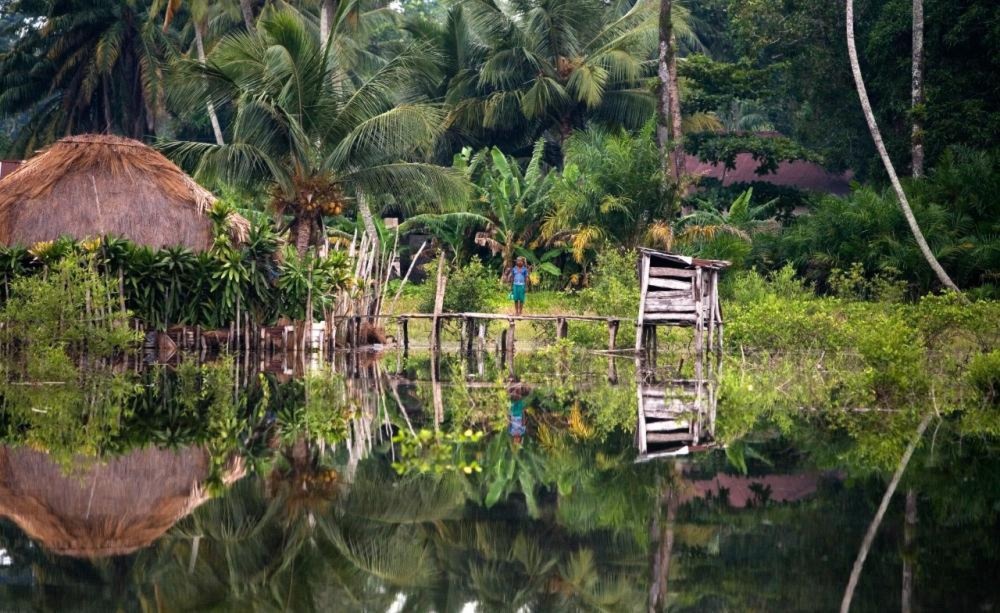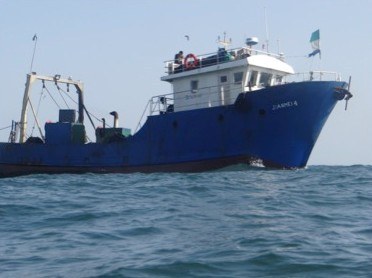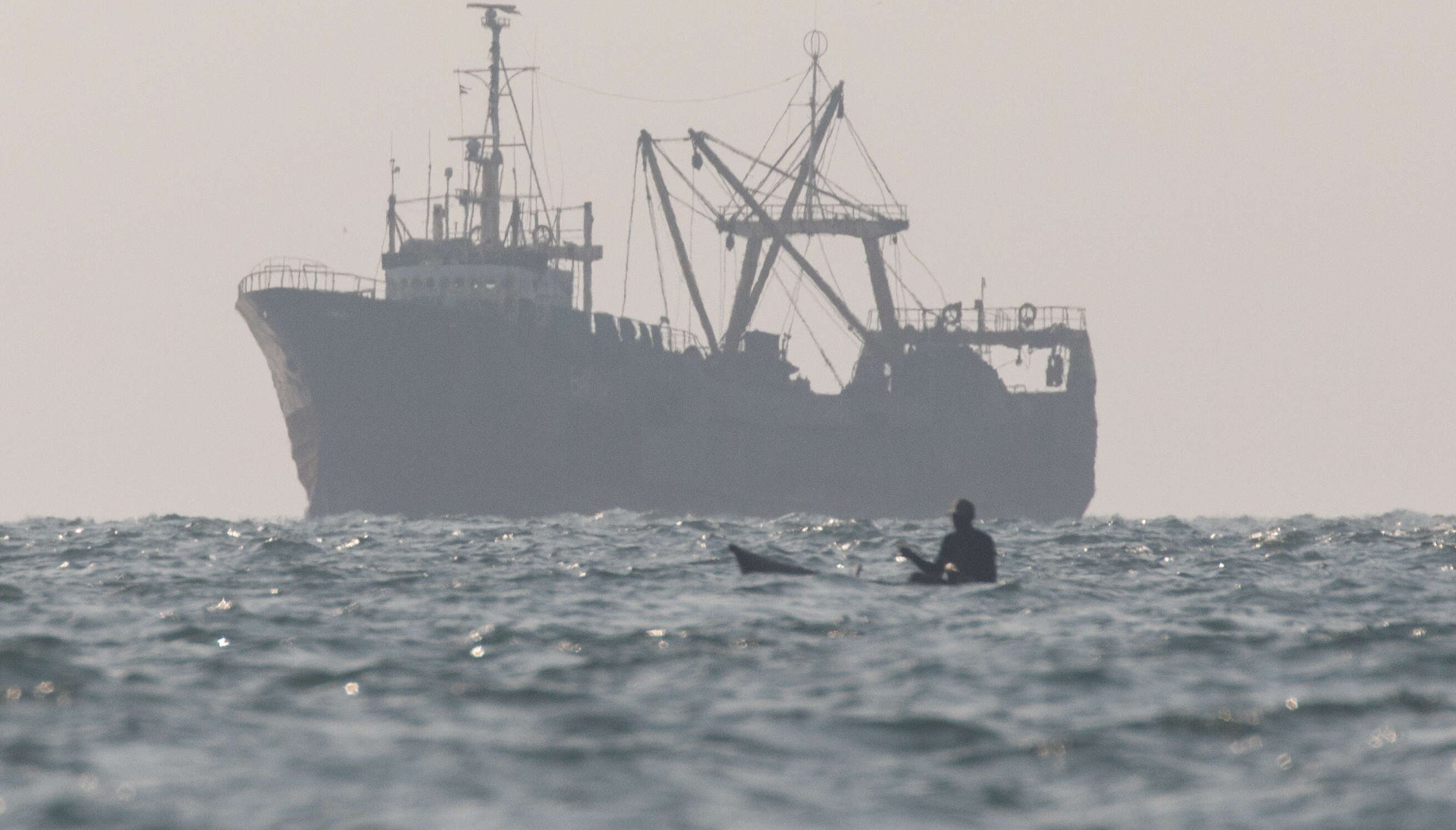
Exiled in Sierra Leone
Sierra Leone is plagued by illegal fishing, where foreign industrial trawlers invade the inshore waters reserved for canoes.
The story of three men who were made destitute by illegal fishing and forced to turn to destructive mangrove logging, shows the desperate need for environmental justice.
In the spring of 2020 Joe, Baggi and Kainyenga were all proud fishermen. Born and raised in the chiefdom of Sittia, in the district of Bonthe, Sierra Leone, they were part of a tradition that had lasted for generations.
Every morning they would ready their canoes and paddle out to the fishing grounds, every evening on the beaches they would land the catch, haggle with the fishmongers, and go home to their families.
Threat
But for all three this is now a past life. A few months before we spoke to them in October that year, trawlers fishing illegally in inshore waters destroyed their nets. They received no compensation from either the vessel owners or the government. With no way to pay their debts, they fled.
The people of Bonthe have relied on fishing as their main livelihood and source of food for centuries. But this way of life is under threat.
Sierra Leone is plagued by illegal fishing, where foreign industrial trawlers invade the inshore waters that are reserved for canoes. Their nets scoop out vast quantities of marine life, destroying habitats, devastating fish populations and often tearing apart canoe fishers’ nets.
Many small-scale fishers in Sierra Leone take out loans to fund their fishing trips and equipment. They will borrow, not from formal financial institutions, but other members of the community, paying off their debts over time by selling their catch.
Most are about US$ 700-900 in debt estimates suggest. A substantial sum for people whose monthly income is unlikely to exceed US$ 100.
Exile
Now, with no chance of compensation, Joe, Baggi and Kainyenga must live in exile. Whenever they hear that people from Sittia are in town, they hide – partly out of fear of reprisals, but mostly out of shame. They have not talked to their families or friends for months.
With no hope of return, and no way to fish, the three men have turned to logging mangrove forests in the Sherbro River estuary to make a living.
Despite sporadic efforts to control cutting, mangroves are not legally protected by the central government in Sierra Leone. Instead, they are controlled by traditional by-laws imposed by chiefdom authorities and Community Management Associations in fishing communities.
Some places have done a better job than others at managing mangroves sustainably, but overall, mangrove cover in Sierra Leone has decreased by around 25 percent since 1990, according to estimates.
These ecosystems provide an enormous public service to Sierra Leoneans. They support fisheries by providing nurseries and spawning areas for most species that are sold commercially in Sierra Leone.
Loss
They protect shorelines from coastal erosion – a huge threat to coastal communities in the country – and other direct impacts of the climate crisis, such as increasingly severe storms.
Mangroves also benefit Sierra Leone and the global community more broadly, as they take up and store vast amounts of carbon – four times as much per hectare as tropical forests.
It is easy to see the domino effect: if trawlers continue to fish illegally in inshore waters, destroying the livelihoods of local fishers, more and more people will turn to mangrove logging as an alternative, and the protection and services these ecosystems provide to communities and the planet will be lost.
With the loss of the mangroves, a host of further intertwined environmental and human consequences are likely to follow.
Mangrove degradation means further coastal erosion, which means forced displacement of coastal communities and an influx to urban areas. Further pressure on cities means rising inequality, poverty and tensions.
Justice
The story of Joe, Baggi and Kainyenga is not an isolated case. Fishers regularly report that their nets are being destroyed by trawlers and there is currently no way for them to get compensation from the culprits.
Only if we achieve environmental justice – the equal right to a secure and healthy environment for all, in a world where ecosystems thrive – can we end this deepening spiral of destruction.
When people like these men are able to make a fair, sustainable living without fear that it will be taken from them by those exploiting the natural world to the point of collapse.
This sad story of exploitation and degradation is being repeated across the world. The ecosystems that form our life support system are under unprecedented strain and the local communities and Indigenous peoples whose lives depend directly on them are ripped apart.
This is why as a global community we must achieve environmental justice before it is too late.
This story originally appeared at The Ecologist and is reproduced here with permission.
SIGN UP FOR OUR EMAILS AND STAY UP TO DATE WITH EJF

